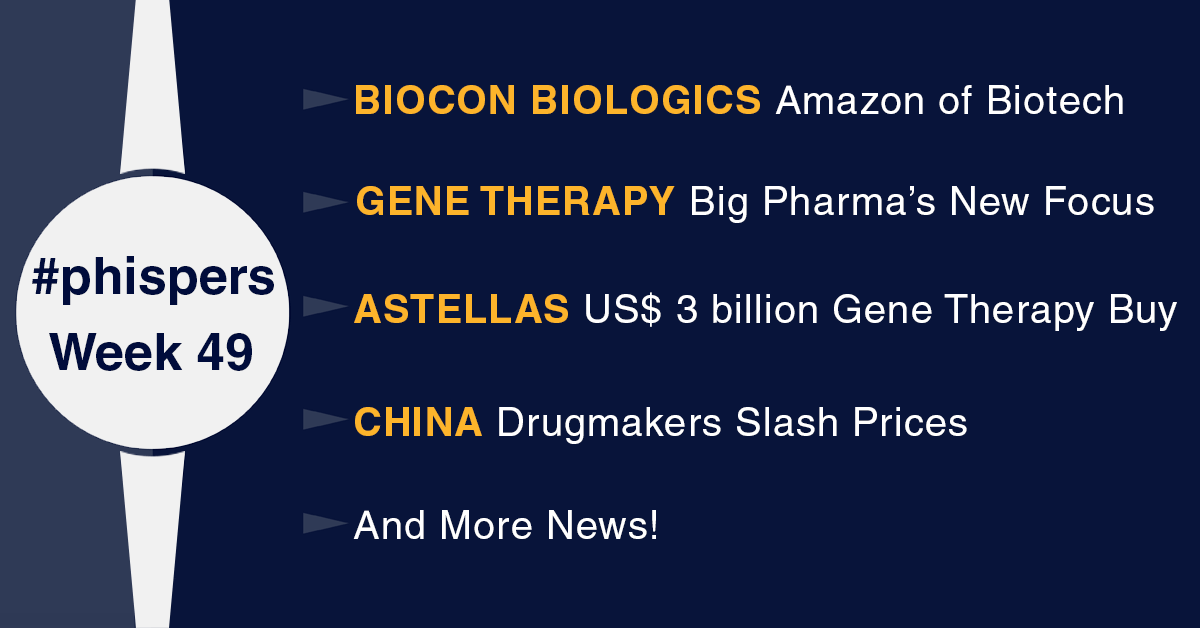Big pharma slash prices for China’s insurance scheme; plan major investments in gene therapy

This week, Phispers brings you news on 11 large multinational drugmakers, including Pfizer and Novartis, that have set aside US$ 2 billion to invest in gene therapy manufacturing since 2018 to better control production of these expensive drugs.
In China, multinational drugmakers like AstraZeneca, Gilead, Sanofi and Roche have cut prices of 70 drugs by more than 60 percent on average in return for their inclusion in the Chinese government’s insurance scheme.
After Heritage Pharma in June, Rising Pharma settled a generic drug price fixing case with the US Department of Justice this week.
Meanwhile, Sanofi sold off its surgical products unit Seprafilm to Baxter for US$ 350 million.
Japan’s Astellas Pharma acquired American drugmaker Audentes Therapeutics for about US$ 3 billion in cash.
And Biocon and Mylan launched their Herceptin biosimilar — Ogivri — in the US.
Big pharma plan
major investments in gene therapy manufacturing plants
An analysis undertaken by Reuters says 11 drugmakers led by Pfizer and Novartis have set aside US$ 2 billion to invest in gene therapy manufacturing since 2018 in order to better control production of the world’s priciest medicines.
While Pfizer has allocated US$ 600 million to build its own gene therapy manufacturing plants, Novartis revealed a US$ 500 million plan to the news agency.
Drugmakers say building their own manufacturing plants is a response to the rising costs and delays associated with relying on third-party contract manufacturers, who are also expanding to capitalize on demand.
Gene therapies hold the potential to cure devastating illnesses in a single dose, and are quite expensive. They aim to correct certain diseases by replacing the missing or mutated version of a gene found in a patient’s cells with healthy copies. Such therapies could command prices of well above US$ 1 million per patient.
Therefore, gene therapy is one of the hottest areas of drug research and the US Food and Drug Administration (FDA) is helping speed treatments to market. However, gene therapy treatments are extremely complex to make, involving the cultivation of living material, and they continue to pose a risk of carrying serious side effects.
For drugmakers, it helps to own their gene therapy facilities as the proprietary production methods are safeguarded. They can also address any concerns raised by the FDA more effectivity.
“There’s so little capacity and capability at contract manufacturers for the novel gene therapy processes being developed by companies,” said David Lennon, president of AveXis, Novartis’s gene therapy division. “We need internal manufacturing capabilities in the long term.”
The FDA has approved two gene therapies so far, and both have been developed by Novartis — Kymriah (in August 2017) and Zolgensma (in May 2019). Months after its approval, the US$ 2 million therapy for a rare muscular disorder had got embroiled in a data manipulation scandal. And industry executives say the Zolgensma scandal has highlighted the importance of having a consistent manufacturing process for gene therapies. In August this year, the FDA said it is investigating alleged data manipulation by former executives at Novartis’ AveXis unit.
There are currently several hundred gene therapies under development by around 30 drugmakers for conditions such as hemophilia, Duchenne muscular dystrophy and sickle cell anemia. The FDA expects 40 new gene therapies to reach the US market by 2022. However, post the Zolgensma scandal, the FDA is also keeping a close eye on standards.
Meanwhile, Novartis is setting up a new US$ 90 million cell and gene therapy factory in northern Switzerland. The unit is on track to begin commercial production of its cell therapy Kymriah for cancer in 2020.
The new factory, expected to employ 450 people, will allow Novartis to make its Kymriah treatment for European patients without first having to fly their immune cells across the Atlantic. Novartis expects cell and gene therapies to contribute about 15 percent of its revenue.
The Swiss factory, as well as a separate French site that is also being expanded, are central to Novartis’s plans to transform Kymriah from a modest US$ 250 million-per-year seller into a US$ 1 billion blockbuster as European demand rises.
Drugmakers
slash prices to make it to China’s reimbursement list
In China, multinational drug companies have agreed to slash the prices of almost 100 drugs as the industry tries to strengthen its foothold in the world’s second-largest drug market. These drugs will be added to a nationwide insurance scheme in China.
AstraZeneca, Gilead, Sanofi and Roche are among the multinationals that have agreed to cut the prices of 70 drugs by more than 60 per cent on average in return for their inclusion in China’s state-run insurance scheme.
These are the latest among several such price cuts made by MNC drugmakers in order to drive up sales in China as pressure to lower prices builds in the US.
The cuts will affect several top-selling medicines, including Adalimumab, an arthritis treatment sold by US drugmaker AbbVie under the brand Humira. China’s state-run co-payment scheme covers a significant portion of patients’ costs and now applies to 2,700 drugs.
The imported drugs added to the insurance scheme will be sold at the “lowest prices worldwide” as a result of the latest round of negotiations, said Xiong Xianjun, an official at China’s National Healthcare Security Administration.
“Being added to the national medical insurance can be a good thing, but production has to be able to keep up with demand,” said John Lin, an analyst with Ernst & Young.
China has also added a range of innovative cancer drugs to a list of medicines eligible for reimbursement from the national insurance system.
Meanwhile, China said it will use its national drug bulk-buy scheme to lower the price of drugs currently sold at higher prices compared with other markets.
The move could force international drugmakers to cut prices even further and enable copycat medicines to replace imported off-patent brands at a faster pace.
The bulk-buy program, which currently covers 25 types of medicines, allows no more than three successful bidders access to China’s public hospitals, where most Chinese people buy their drugs.
After Heritage,
Rising Pharma settles generics drug price fixing case with DOJ
In June, we had carried a news on how Heritage Pharmaceuticals Inc had agreed to settle allegations under the US False Claims Act pertaining to price fixing of several generic medicines by paying US$ 7.1 million.
Six months on, another pharmaceutical company — Rising Pharmaceuticals — admitted to price fixing and working with a competitor to rig the market on a hypertension drug, the US Department of Justice (DOJ)said in a statement this week.
Under a deferred prosecution agreement, Rising Pharmaceuticals will cooperate with prosecutors as they look into other players in the industry, and it further agreed to pay more than US$ 3 million in criminal penalties, restitution and civil damages.
According to the DOJ statement, “from about April 2014 until at least September 2015, Rising participated in a criminal antitrust conspiracy with a competing manufacturer of generic drugs and its executives to fix prices and allocate customers for Benazepril HCTZ, a medicine used to treat hypertension”.
Top generics players have been facing the price-fixing heat for years now. This year, Senator Bernie Sanders and the late Republican Elijah Cummings had urged the DOJ to get moving. They wrote to Attorney General William Barr that they’re “concerned about the lack of enforcement.”
Recently, there was news that Teva and other companies have been in talks with the DOJ over the last six months to resolve a long-running criminal antitrust probe of alleged price-fixing by these companies. One of the outcomes of such talks could be deferred prosecution agreements. Such agreements would benefit the government and generic drugmakers alike, as they would allow the companies and federal payers to continue to conduct business with each other.
Days before
Sanofi’s strategic revamp announcement, it
strikes US$ 350 million deal
Last week, we had reported on how the new Sanofi CEO Paul Hudson is likely to announce a new strategy around December 10 when he meets investors for a capital markets day in Cambridge. There was also news that Hudson is mulling options for their consumer health division.
This week, we learn that just days before the big announcement of its new strategy, Hudson lined up a US$ 350 million sale. The French multinational is selling its surgical products unit Seprafilm to Baxter.
The announcement was made by Baxter on December 2. The deal gives Baxter's surgery division an adhesion barrier product meant to reduce incidence and severity of postoperative scarring in patients undergoing abdominal or pelvic laparotomy procedures.
Baxter said it expects the deal to close no later than the first quarter of 2020 and anticipates the acquired products to generate US$ 100 million in sales in the following year.
Seprafilm is a clear film meant to form a barrier between abdominal tissue and organs to reduce adhesions, or scarring, after surgery. Seprafilm reportedly drew interest from other healthcare companies and private equity firms.
Sanofi gained Seprafilm in its US$ 20 billion-plus buyout of Genzyme in 2011.
Astellas
announces US$ 3 billion gene therapy push with buyout of Audentes
Japan’s Astellas Pharma Inc is acquiring American drugmaker Audentes Therapeutics Inc for about US$ 3 billion in cash in an over-priced bid to make genetic medicines a key area of growth.
Astellas, which is Japan’s second-largest drugmaker by sales, is offering US$ 60 per share for Audentes, which is a 110 percent premium to its closing price on Monday.
Citi analyst Hidemaru Yamaguchi said that while the deal looked expensive, it was a positive move for Astellas as Audentes had “cutting-edge gene therapy modalities”.
“Recent scientific and technological advances in genetic medicine have advanced the potential to deliver unprecedented and sustained value to patients, and even to curing diseases with a single intervention,” said Kenji Yasukawa, President and CEO, Astellas.
Audentes’ investigational drug, AT132, is being developed to treat a rare genetic neuromuscular disorder which results in extreme muscle weakness, respiratory failure and in some cases early death. Astellas said the companies plan to seek FDA approval for AT312 in mid-2020.
Gene therapies aim to cure diseases by replacing the missing or mutated version of a gene found in a patient’s cells with healthy copies.
“As a result of this acquisition, Astellas will obtain not only Audentes programs but also its proprietary manufacturing knowhow in gene therapy,” Astellas CFO Naoki Okamura said.
The acquisition marks the second biggest on record for Astellas after its 2010 purchase of OSI Pharmaceuticals Inc for US$ 3.8 billion, according to Refinitiv data. Astellas expects the deal, which is subject to regulatory approval including US antitrust clearance, to close in the first quarter of 2020.
Biocon
launches Herceptin biosimilar in US; says it wants to be Amazon of biotech
Mylan and Biocon have launched their Herceptin biosimilar — Ogivri — in the US. Herceptin is Roche’s blockbuster breast and stomach cancer drug.
Ogivri is the second biosimilar of Herceptin after Amgen launched copies of both Herceptin and Avastin (a colorectal cancer drug) in July this year.
“With regulatory approval for our biosimilar (Herceptin) in more than 80 countries worldwide, we are bringing vast global biosimilars experience to the US and look forward to continuing our work with all stakeholders in the healthcare system to reduce costs, improve access and advance care," Mylan President Rajiv Malik said in a statement.
Mylan said Ogivri would hit the market at a “competitive discount” to Herceptin. However, it did not disclose the list price for its 420-milligram and 150-milligram vials.
Meanwhile, Biocon’s subsidiary — Biocon Biologics — is focusing on innovative business models to reduce the cost of human insulin and cancer drugs, as it looks to build a pipeline of 28 biosimilars across global markets, the company’s chief executive said.
“We want to be the Amazon of biotech pharma going beyond the product. You don’t have to do ecommerce, but we want to be as innovative and as disruptive as Amazon was. We want to transform healthcare,” Christiane Hamacher, CEO of Biocon Biologics, said.
Biocon Biologics will chart a path that ensures high volumes and low costs, unlike competitors,
The company plans to create an ecosystem where patients not only have access to the right medicine, but also get the right care without always reaching a hospital.
Innovative technology will enable this model. The company is chasing a revenue target of US$ 1 billion in financial year 2021-22. Last fiscal year, it crossed US$ 200 million in revenue.
The PharmaCompass Newsletter – Sign Up, Stay Ahead
Feedback, help us to improve. Click here
Image Credit : #Phisper Infographic by SCORR MARKETING & PharmaCompass is licensed under CC BY 2.0
“ The article is based on the information available in public and which the author believes to be true. The author is not disseminating any information, which the author believes or knows, is confidential or in conflict with the privacy of any person. The views expressed or information supplied through this article is mere opinion and observation of the author. The author does not intend to defame, insult or, cause loss or damage to anyone, in any manner, through this article.”







